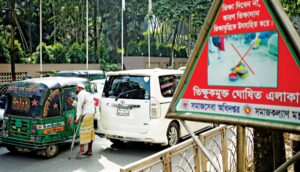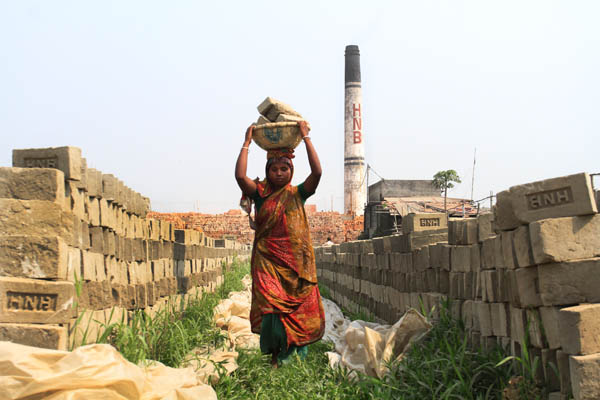 Bangladesh capital Dhaka has recently witnessed a surge in the number of people involved in begging, owing largely to the physical disabilities, lack of employment and ongoing inflation, while many elderly people are taking up begging as adult children refuse to feed them.
Bangladesh capital Dhaka has recently witnessed a surge in the number of people involved in begging, owing largely to the physical disabilities, lack of employment and ongoing inflation, while many elderly people are taking up begging as adult children refuse to feed them.
City dwellers, including shopkeepers and street vendors, reported being approached by an average of 15 to 25 people daily begging alms.
Md Shah Jahan, deputy director of the Department of Social Services under the Ministry of Social Welfare, acknowledged that he had also noticed more beggars, including the professional ones, these days in the capital.
‘The lack of job opportunities in villages during the Kartik season (October-November), coupled with the insufficient crop harvests resulting from excessive rains this year, has led to increased poverty and driven more people to beg in the city,’ said Shah Jahan, who also oversees the ‘Rehabilitation and alternative employment for beggars’ programme in his department.
He also thinks that the Covid-19 pandemic in 2020-2022 and the ongoing inflation have contributed to this rise, while saying that most of the beggars in the capital are professional to whom begging alms is a livelihood choice.
Beggars themselves mentioned that they turned to begging due to unemployment in areas outside the capital, escalating living costs, physical disabilities, and ageing.
The Bangladesh Bureau of Statics recorded food inflation at 12.56 per cent in October for the first time in the past decade and the rural people were facing a higher inflation than the urban residents. Nizam Uddin, a gray haired man of 65, said on Tuesday afternoon in Kalabagan that he came to the capital from Assasuni upazila in Khulna around 20 days ago to collect money for cataract surgery for his left eye.
‘I need money for cataract surgery in my left eye. I manage to collect an average of Tk 200 to Tk 300 a day and spend the night on a rickshaw van in Karwan Bazar,› said Nizam, a father of five children, who used to work as a day labourer in his village.
He, a widower, said that that his children are unable to support him as they are barely making ends meet. He plans to return to the village once he has the necessary money for the surgery.
Parvin, 35, also faces a similar situation. Found asking money for her treatment in front of Basundhara Market in Panthapath on Wednesday morning, a burqa clad Parvin said she is begging to collect money for her medical treatment.
Formerly a garment factory worker, Parvin said that she had suffered a brain stroke six months ago that left her right hand paralysed.
Her rickshaw puller husband cannot anymore make ends meet in this city due to the rising prices of the essentials, Parvin said. ‘We can›t afford to have fish and meat, and we›ve even have to cut eggs and potato from our meals,› she lamented as she begged under the scorching sun.
Beggars are noticed on nearly every street of the city, including Farmgate, Panthapath, Green Road, Shahbagh, Agargaon, Karwan Bazar and Kakrail and in front of the city mosques and markets, and even in the government-declared ‹no begging zones,› such as near the Pan Pacific Sonargaon Hotel and Intercontinental Hotel.
Md Sumon, who runs a tea-stall at Kalabagan for around 15 years, said that nowadays at least 20 to 30 beggars come to his stall for begging daily as the number has increased recently.
‘A group of around ten or more beggars come on the train from outside the capital, including Narsingdi, mostly every Thursday for begging and return the same afternoon,’ said Sumon on Tuesday.
To eliminate begging from the country, the Department of Social Services took up the ‘The Rehabilitation and alternative employment of population engaged in begging’ programme in 2010, and from the fy2017-18, money was initially allocated for 58 districts, later for all districts to end begging.
From 2010-2011 to 2022-23 fiscal years, the government allocated around Tk 75.24 crore and spent more than Tk 42 crore under which benefits were provided to 14,707 beggars in all the 64 districts, according to the website of the department.
The Bangladesh Centre for Human Rights and Development secretary-general Mahbul Haque said that the number of beggars that started to increase after the Covid pandemic keeps rising largely due to price hikes of essentials, lack of job opportunities, and abandonment of the elderly members in the poor families by their adult children.
Mahbul, who has been working with the beggars in Dhaka city since 2009, thinks that the rehabilitation programme has largely failed as very few beggars could reap benefits from it in the real sense.
‘As they have been begging for years, providing psychosocial counselling to bring a change in their mindset is crucial. Also, the beggars have been forcefully rehabilitated in villages where they cannot earn enough,’ Mahbul said, adding that beggars need to be rehabilitated in the place they live in, not in some unknown areas.
Saying that there is no exact data on how many people are now engaged in begging across the country, the department’s deputy director Shah Jahan mentioned that the department sought lists of beggars from the district commissioners across the country in 2017, while estimating that the current beggar population in the country is around 2.5 lakh, including 20,000 in the capital.
New Age









